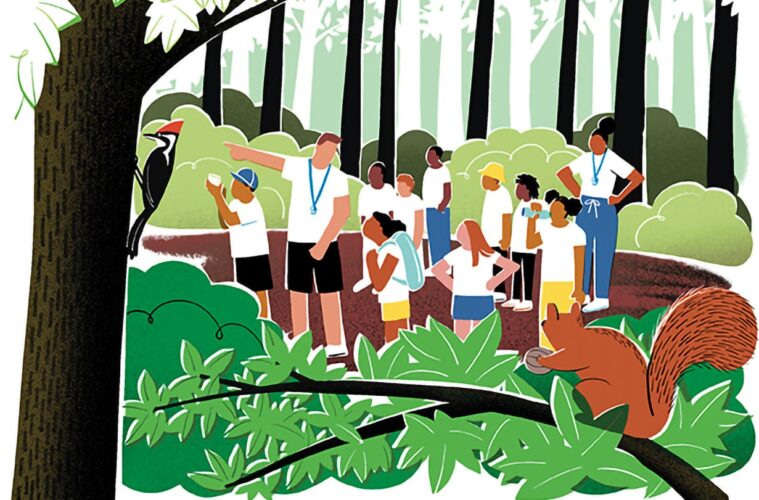Change Summer, founded by Joshua Phillips ’96, gives youth from under-resourced communities an outdoor experience while equipping them with skills for a successful future.
For Joshua Phillips ’96, watching urban youth delight in the simplest of pleasures — like walking barefoot through a meadow — represents more than the culmination of a multifaceted career working with young students. It brings home the importance of positioning kids for success by cultivating and nurturing skills like curiosity. “Yes, education is about going to class and doing the learning,” he says. “But it’s also about being encouraged to figure out what excites you and makes you want to dig deeper.” Who knows, maybe feeling the delicious tickle of the grass on your toes will prompt you to explore the birds, trees, and sky?
A few years ago, Phillips founded Change Summer, a network of camps that partners with schools in under-resourced communities to provide students with summertime experiences. He believes the camps can change lives. “What happens when you’re a teenager from Brownsville, N.Y., or Camden, N.J., and you hop on a bus to come to one of our camps at Union College or Roger Williams?” Phillips asks. “You’re going to have to pick out your own clothes, remember to brush your teeth, walk to the dining hall, and choose your own food. Then, you’re going to turn around and see that you don’t know a soul. It’s an experience that everyone has at college, and then again and again after.”
Ever since graduating from Colgate, where he majored in political science, Phillips has known that he would teach. But it wasn’t until he had risen through the ranks at Uncommon Schools, a charter school organization in New York City, that he realized what prepping students for college really meant. Looking to push Uncommon to the next level as its chief of innovation and school operations, he remembers “hearing from our alums that while we had successfully equipped them to ace calculus and write history papers, they felt at a loss when it came to socio-emotional skills.”
The feedback prompted Phillips to help revamp the high school program so that it incorporated the core socio-emotional skills that best correlate to college success — identified as confidence, curiosity, independence, and responsibility. He also thought beyond academics. His daughter was about to start summer camp and he remembered the formative experiences he had enjoyed while he himself attended camp, and then worked at one. “It just hit me that this could be a fun way to get the kids the skills they were missing,” he says.
It wasn’t reinventing the wheel, because many similar programs exist. But, as Phillips points out, not many are directly linked to public schools.
In its first summer, Camp Uncommon brought 160 students from member charter schools up to Maine, gave them a traditional camp experience — that potent combination of athletics, arts, and outdoor adventure — and tossed in a homegrown Discovery program, which addressed issues like self-care, identity, learning from mistakes, and recognizing opportunities. Camp Uncommon developed a survey that measured students’ skills in terms of the four core success components, before and at the end of the program, and saw a significant amount of growth in academics, attendance, and maturity.
“We started getting calls from other charter school groups interested in participating,” relays Phillips. “It dawned on me that there was a need for this to be bigger, so I wrote a business plan.” By summer 2019, he had launched Change Summer, a nonprofit through which donor gifts and charter school fees keep the cost to parents at just $150 per camper. Its first year brought 1,000 kids pulled from the 55 charters under Uncommon Schools’ umbrella.
Phillips’ organization, where he acts as CEO, now manages the camp program for three other large charter school groups. This summer, he estimates about 3,000 kids will participate, and within the next five years, he’s aiming to enroll 10,000 students across 10 camps.
“Camp has been a big part of different cultures for many years,” he observes. “It boils down to an opportunity for children to let go of every insecurity and feel free to be themselves. And that can’t be taught … you have to experience it.”

